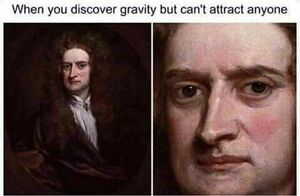Isaac Newton
| Name: | Isaac Newton |
| Date of Birth: | 25 December, 1642 |
| Occupation: | mathematician, physicist, astronomer, theologian, author |
| Ethnicity: | |
Sir Isaac Newton (25 December 1642 – 20 March 1726/27) was an English mathematician and physicist. Some members of the incelosphere regard him as protocel, although not too much is known about his sex life.
Sex life[edit | edit source]
Newton may have been engaged once, but he never married.[1]
Some have argued he was a homosexual (likely a repressed one, owing to his devout but unorthodox religious beliefs) due to his affectionate letters addressed to the young Swiss mathematician Nicolas Fatio de Duillier, though homosocial behavior of this sort between heterosexual men was not uncommon in pre-modern times, and there is little evidence for Newton being homosexual beyond this, despite repeated attempts by LGBT activists to 'claim' Newton.[2]
Stronger evidence exists that Newton was a volcel, possibly owing to his devout religious beliefs (as mentioned above), or potentially because he was constitutionally disinclined towards intimate relations, perhaps owing to his strong autistic-like traits.
Indeed, when Newton reached 50 years of age, his friends, the philosopher John Locke and the writer and politician Samuel Pepys possibly attempted to arrange a marriage for Newton, as was socially expected at the time for men of his stature.[3] This act seemingly contributed to Newton having a nervous breakdown, with a furious Newton breaking off his friendship with the Locke and Pepys. Certain details of this breakdown were revealed in an apology letter Newton later wrote to Locke revealing he had wished Locke was dead, as he believed Locke was attempting to "embroil [him] with woemen (sic)".[4]
The widespread belief that he died a virgin has been commented on by various writers, physicists and mathematicians,[1] most notably by the French enlightenment era writer and philosopher Voltaire, who claimed that Newton's virginity was "confirmed by the doctor who was with him when he died", and that Newton had "neither passion nor weakness; he never went near a woman".[5] Remarking on Newton's interpersonal relationships (or lack thereof) writer Aldous Huxley wrote: "If we evolved a race of Isaac Newtons, that would not be progress. For the price Newton had to pay for being a supreme intellect was that he was incapable of friendship, love, fatherhood, and many other desirable things. As a man he was a failure; as a monster he was superb."
References[edit | edit source]
- ↑ 1.0 1.1 https://en.wikipedia.org/wiki/Isaac_Newton#Personal_relations
- ↑ https://skeptics.stackexchange.com/questions/8017/was-sir-isaac-newton-a-homosexual
- ↑ https://corpusnewtonicum.wordpress.com/2015/04/27/why-you-endeavoured-to-embroil-me-with-woemen/
- ↑ https://www.newtonproject.ox.ac.uk/view/texts/normalized/OTHE00078?start=par79&end=par97
- ↑ https://medium.com/@denislesak/why-isaac-newton-died-a-virgin-192decd2a750
